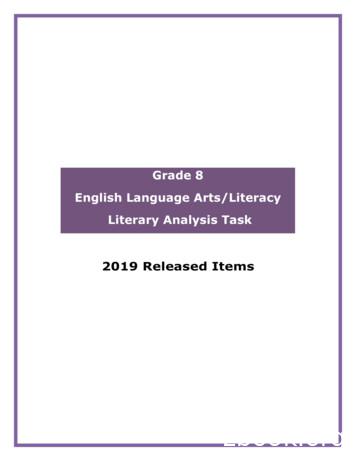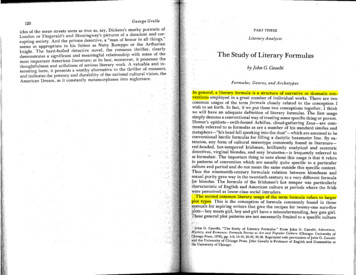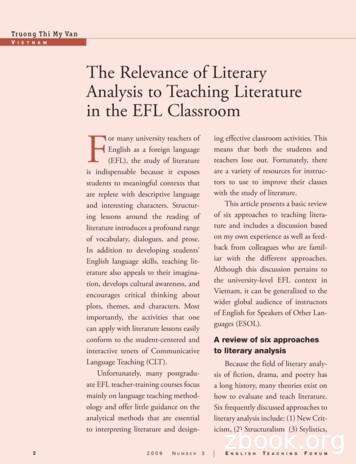Download A Guide To Basic Literary Theory: What Every English Major . [PDF]
Description: Literary theory does not mean making hypotheses or guesses about literature. In the field of English studies (and most academic disciplines), theory refers to the study of the underlying assumptions we make about the nature of language, authors, readers, texts, human subjectivity,.
Size: 635.08 KB
Type: PDF
Pages: 6
This document was uploaded by user and they confirmed that they have the permission to share it. If you are author or own the copyright of this book, please report to us by using this DMCA report form.
Report this link-
Tags:
An Introduction to Literary Criticism and Theory Before we begin our examination and study of literary theory, it is important that we define exactly what literary theory is and is not, identify some of the main characteristics of such, as well as identify some of the key differences between traditional “literary criticism” and “literary theory.” While literary criticism since the late .
expository guide to literary criticism or literary concepts, nor does it attempt to catalogue the entire body of literary terms in use. It offers instead to clarify those thousand terms that are most likely to cause the student or general reader some doubt or bafflement in the context of literary criticism and other discussion of literary works.
Literary Analysis Sample Paper. A literary analysis is an argumentative analysis about a literary work. Although some summary is needed within the argument of a literary analysis, the objective is not to write a report about a book or story. Instead, a literary analysis discusses a writer’s interpretation of a text through
Literary Analysis Sample Paper August 2016 Provided by the Academic Center for Excellence 1. Literary Analysis Sample Paper. A literary analysis is an argumentative analysis about a literary work. Although some summary is needed within the argument of a literary analysis, the objective is not to write a report about a book or story.
Literary Analysis Sample Paper August 2016 Provided by the Academic Center for Excellence 1. Literary Analysis Sample Paper. A literary analysis is an argumentative analysis about a literary work. Although some summary is needed within the argument of a literary analysis, the objective is not to write a report about a book or story.
Introduction to Literary Criticism. Definition and Use “Literary criticism” is the name given to works written by experts who critique—analyze—an author’s work. It does NOT mean “to criticize” as in complain or disapprove. Literary criticism is often referred to as a “secondary source”. Literary Criticism and Theory Any piece of text can be read with a number of different .
Academic literary criticism prior to the rise of “New Criticism” in the United States tended to practice traditional literary history: tracking influence, establishing the canon of major writers in the literary periods, and clarifying historical context and allusions within the text. Literary biography was and still is an important interpretive method in and out of the academy; versions of .
literature itself. What a Literary Analysis IS A literary analysis is an opinion. You (the writer) are forming an opinion about a literary work, then presenting that opinion (and, more importantly, supporting that opinion) in the form of an essay. Essays about literature should be written in third-person point of view, like any other analytical .
ENG125: Introduction to Literature Critical Literary Theories Purpose: Use this resource to learn about literary criticism. What is literary criticism? Literary Critical Theory is a tool that helps you find meaning in stories, poems
Grade 8 English Language Arts/Literacy . Literary Analysis Task . English LanguageArts/Literacy . 2019 Released Items: Grade 8 Literary Analysis Task The Literary Analysis Task requires students to read two literary texts that are purposely p
The premise of Literary Theory: The Basicsis that literary theory and literary practice - the practice of interpretation - cannot indeed very well be separated, and certainly not at the more advanced level of academic literary studies. One of its aims, then, is to show how theory and practice are inevitably connected and have always been .
Terry Eagleton (T errence Francis Eagleton) is a contemporary literary scholar and a prominent cultural theorist, widely regarded as the one of the foremost Marxist literary critics. With the publication of Marxism and Literary Criticism , and Literary Theory, a popular college text, Eagleton won recognition for producing erudite works of literary
work/products (Beading, Candles, Carving, Food Products, Soap, Weaving, etc.) ⃝I understand that if my work contains Indigenous visual representation that it is a reflection of the Indigenous culture of my native region. ⃝To the best of my knowledge, my work/products fall within Craft Council standards and expectations with respect to
A Reader’s Guide to Contemporary Literary Theoryis a classic introduction to the ever-evolving field of modern literary theory, now expanded and updated in its fifth edition. This book presents the full range of positions and movements in contemporary literary theory. It organises the theories into clearly defined sections and presents them in an accessible and lucid style. Students are .
MOUNT ASPIRING COLLEGE DEPARTMENT OF ENGLISH - FEMINIST LITERARY CRITICISM - PAGE !3 OF !7. WHAT MARXIST CRITICS DO TAKEN FROM BEGINNING THEORY, BY P. BARRY2: 1. They make a division between the ‘overt’ (manifest or surface) and ‘covert’ (latent or hidden) content of a literary work (much as psychoanalytic critics do) and then relate the covert subject matter of the literary work to .
Literary Analysis The Study of Literary Formulas by fohn G. Cawelti Formulas, Genres, and Archetypes In general, a literary formula is a structure of narrative or dramatic con ventions employed in a great number of individual works. There are two common usages of the term formula closely related to the conception_ I wish to set forth.
to literary analysis. Because the field of literary analy-sis of fiction, drama, and poetry has a long history, many theories exist on how to evaluate and teach literature. Six frequently discussed approaches to literary analysis include: (1) New Crit-icism, (2) Structuralism, (3) Stylistics,
Introduction: What Is Literary Theory and Why Should I Care? LEARNING OBJECTIVES. 1. Examine the kinds of questions that literary theories attempt to answer. 2. Explore the relevance of literary theory to undergraduate studies. 3. Review the steps of the writing process. 4. Develop a plan
“The Tell-Tale Heart” Literary Response English 8 Prompt: Describe in a literary response essay how the author creates suspense throughout the characters, setting, and plot. Assignment: In response to this prompt, you will write a 5-paragraph literary response essay.
Literary Terms Chris Baldick is Professor of English at Goldsmiths' College, University of London. He edited The Oxford Book of Gothic Tales (1992), and is the author of In Frankenstein's Shadow (1987), Criticism and Literary Theory 1890 to the Present (1996), and other works of literary history. He has edited, with Rob Morrison,



















